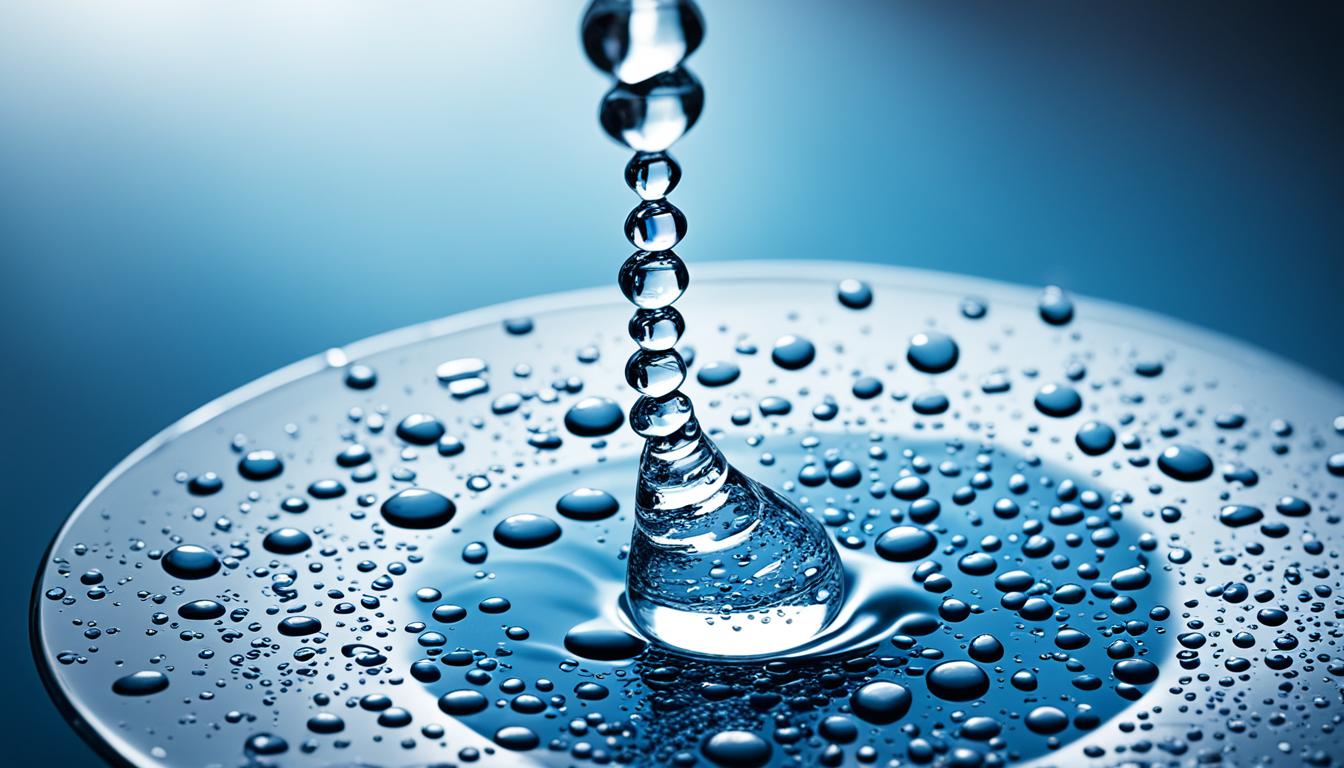Water fasting has become popular lately as a way to quickly shed pounds. It might also boost your health. This fasting method means you only drink water for a period, usually 24 to 72 hours. Though it might help against some diseases and encourage autophagy, there are also risks.
People fast for water for reasons like religion, losing weight, cleaning toxins, and health boosts. Some studies show it could lessen your chance of getting certain cancers, heart problems, and diabetes. The lemon detox cleanse is similar but lasts up to 7 days. It involves drinking lemon juice, water, maple syrup, and cayenne pepper.
There are few studies on water fasting in people, and it has its dangers. These include dehydration, not getting enough nutrients, and losing muscle. It could also harm if you have gout or an eating disorder. Consulting a healthcare professional before starting any fast is crucial for your safety.
Water fasting isn’t right for everyone. Eating well and being mindful might be a better choice for health and losing weight. It’s very important to think about your long-term health and talk to a doctor about fasting or detox plans.
What is Water Fasting?
Water fasting means not eating any food or drinking anything except water. It’s getting popular for improving health by boosting weight loss, detoxing, and wellness. It’s usually done for 1 to 3 days, but longer fasts need a doctor’s okay.
While water fasting, you only drink water, aiming for 2-3 liters daily. People try this to get healthier since studies show it might cut cancer, heart disease, and diabetes risks. It also triggers autophagy, or the body getting rid of old cell parts.
Definition and Overview
Water fasting cuts out all food and drink besides water. Most go for 1 to 3 days. Past that, it’s best to have a doctor check in to be safe.
People do it to feel fitter. Studies hint at big health boosts, like fighting major diseases and sparking autophagy. This cellular process improves health by recycling bad parts of cells.
Historical and Modern Uses
People have been fasting for spiritual and health reasons for ages. It was, and still is, a part of several cultural and religious practices.
Today, fasting is seen as a smart health move. It’s linked to losing weight, being healthier, and not getting some diseases. Water fasting, like with the lemon detox, has become quite popular.
Water fasting is also believed to start autophagy. This natural clean-up of cells may help stop health issues like cancer and Alzheimer’s.
| Duration | Potential Benefits | Risks |
|---|---|---|
| 24-72 hours | Weight loss, detoxing, lower risk of chronic diseases, promotion of autophagy | Dehydration, electrolyte imbalances, muscle loss, orthostatic hypotension |
| Longer than 72 hours | Reduced blood pressure, improved cholesterol levels, enhanced insulin and leptin sensitivity | Increased risk of complications, requires medical supervision |
Caution is key with water fasting, despite potential benefits. Always talk to a doctor first. It’s not for everyone, like those with certain health problems, pregnant women, or kids, unless a doctor approves.
How to Water Fast Safely
Water fasting can help with health benefits and losing weight. But, it’s important to be careful and get ready before you start. You must know the risks and keep yourself safe during fasting.
Preparing for a Water Fast
If you have certain health conditions, it’s best not to fast without a doctor. These conditions include gout, diabetes (both types), eating disorders, and being a child, an older adult, or pregnant. For first-timers, prep your body by eating less for 3-4 days. You can eat smaller meals or skip food for some time.

Duration and Guidelines
During a water fast, only drink water. You should aim for 2-3 liters each day. Fasting normally lasts between 24-72 hours. It’s risky to go beyond that without a doctor. You might feel dizzy, sick, have a headache, get constipated, feel weak, or not be able to work well. Drink enough water to stay hydrated.
| Fasting Duration | Recommended Water Intake | Potential Symptoms |
|---|---|---|
| 24-72 hours | 2-3 liters per day | Dizziness, nausea, headaches, constipation, low blood pressure, decreased productivity |
Breaking a Water Fast
After the fast, don’t eat too much too quickly – it can make you uncomfortable. Start with a smoothie or small meals. As the day goes on, you can have bigger portions. This is very important if your fast lasts 3 days or more. It prevents a dangerous reaction called refeeding syndrome.
It’s essential to prioritize your health and well-being when considering a water fast. Always consult with a healthcare professional before starting a fast, especially if you have any pre-existing medical conditions or concerns.
To stay safe and get the most from water fasting, prepare well and follow the rules. But remember, fasting isn’t right for everyone. Watch how your body reacts and see a doctor if you’re not sure.
Potential Benefits of Water Fasting
Water fasting has become a popular way to boost health and wellness. It’s true that we need more studies to see all its effects. But, some research shows benefits for both animals and people who’ve tried it.
Promoting Autophagy
Autophagy lets the body clean up old cell parts. By doing this, the process helps keep the body functioning well. Water fasting has shown to boost autophagy in animals. This might fight off diseases like cancer and Alzheimer’s. It might even help you live longer, but we need more human studies to be sure.
Lowering Blood Pressure
Having high blood pressure is a big risk for heart problems. Some studies hint that longer water fasts could help lower it. In one study, people fasted for 17 days with supervision. Their blood pressure went down, and their heart health markers got better. Another review found that fasting can help with blood pressure and weight. However, we still need more info on shorter fasting periods.
Improving Insulin and Leptin Sensitivity
Insulin and leptin are keys to keeping the body working right. Water fasting may actually make these hormones work better. This could mean lower blood sugar and healthier hunger signals. This, in turn, could lower your chances of getting too heavy or diabetes.
Reducing Chronic Disease Risk
Some research says water fasting might lower risks for diabetes and heart disease. One study in 2013 showed that just a 24-hour fast could lower heart disease risk. Water fasting might also help the heart beat free radicals, which are bad for cells. In both animals and studies with people, water fasting has been linked to fighting cancer. But, we need more proof from human studies.
| Potential Benefit | Key Findings |
|---|---|
| Autophagy | Animal studies suggest water fasting promotes autophagy, which may protect against cancer, Alzheimer’s, and heart disease. |
| Blood Pressure | Longer, medically supervised water fasts may help lower blood pressure in people with hypertension. |
| Insulin and Leptin Sensitivity | Water fasting may improve the body’s sensitivity to insulin and leptin, leading to better metabolic health. |
| Chronic Disease Risk | Studies suggest water fasting may reduce risk factors for diabetes, cancer, and heart disease, but more human research is needed. |
Water fasting looks promising, but it’s wise to be careful. Always talk to a doctor before trying it. We still need more studies to know everything about its effects on us.
Risks and Precautions
Water fasting can be good for your health, but it’s important to know the risks. Without proper medical advice, it can cause problems. So, knowing the risks and how to prevent them is key for a safe fast.

Dehydration and Electrolyte Imbalances
Dehydration is a major risk when you water fast. Surprisingly, not eating can make you lose water. This is because our food is a big source of our daily water. Lack of food means you need to drink more water to stay hydrated.
Symptoms like dizziness and headaches can warn you of dehydration. To avoid these, drink plenty of water, about 2-3 liters a day. Mineralized water is a top choice during fasting.
Muscle Loss and Weakness
When you fast, you may lose weight quickly. But not all early weight loss is good—it often includes water, muscle, and carbs. Muscle loss is a concern among experts.
Some studies, though, show fasting might help with muscle loss. This area needs more research to be sure.
Orthostatic Hypotension
Water fasting and dehydration can cause orthostatic hypotension. This means blood pressure drops when you stand up. It can make you feel dizzy or lightheaded, even risk fainting.
If fasting makes these symptoms worse, it might not be for you. Plus, avoid driving or using machines if you feel faint.
Contraindications for Certain Medical Conditions
Water fasting is short, but it can worsen a few health issues. People with gout need to be careful because fasting can up their uric acid levels. This might trigger a gout attack.
If you have an eating disorder, water fasting is not advised. It can worsen unhealthy eating habits. Also, certain health conditions mean you should not fast. Always talk to a doctor before you start, so they can check if it’s safe for you.
| Risk Factor | Potential Complications | Precautions |
|---|---|---|
| Dehydration | Dizziness, nausea, headaches, constipation, low blood pressure, decreased productivity | Consume 2-3 liters of water daily, especially mineralized water |
| Muscle Loss | Rapid weight loss, breakdown of muscle mass (sarcopenia) | More research needed to determine the impact of water fasting on muscle mass |
| Orthostatic Hypotension | Sudden drop in blood pressure, dizziness, lightheadedness, fainting risk | Avoid driving or operating heavy machinery; consider alternative fasting methods if symptoms persist |
| Medical Conditions | Aggravation of gout, encouragement of disordered eating behaviors | Consult with a healthcare professional before attempting water fasting |
Despite the benefits, it’s essential to know the dangers of water fasting. Dehydration, muscle loss, and other health risks must be considered. Always get medical advice and drink lots of water during the fast. Be cautious if you have health issues or a bad medical history.
Water Fasting for Weight Loss
Water fasting is known for quick weight loss. You only drink water for 24-72 hours. In a study, 12 men lost an average of 13 pounds in eight days.
This rapid weight loss is mostly water weight, not fat. Some of it may come from losing muscle too. Water fasting can be risky, causing harmful effects like dehydration and muscle breakdown.
Fasting with water might seem a fast weight loss option. Yet, health experts recommend a balanced diet and regular exercise for long-term success. The CDC suggests slow weight loss is better for keeping it off than fast methods like water fasting.
Intermittent fasting and time-restricted eating help with weight loss. They can improve blood sugar and lipid levels. This method can also boost energy and digestion. A study with over 100,000 people showed these benefits.
Before starting a water fast, talk to a doctor. They can help you understand if it’s safe for you. Not everyone should try water fasting, especially those with certain health conditions or on certain medications.
| Study | Participants | Duration | Results |
|---|---|---|---|
| 2021 study | 12 middle-aged men | 8 days | Significant changes in blood and urine markers, reduced weight |
| 2022 study | 48 men and women with overweight or obesity | At least 10 days | Decreases in weight, BMI, and blood pressure; high dropout rate due to side effects |
In the end, water fasting isn’t recommended for lasting weight management. Eating healthy, staying active, and being mindful are better for your health. These practices support keeping a healthy body weight for the long run.
Conclusion
Water fasting offers many possible health benefits. It might help with things like lowering blood pressure and reducing the risk of chronic diseases such as diabetes, cancer, and heart disease. There’s evidence from both animal and human studies suggesting it lowers the risk of certain cancers, heart disease, and diabetes. Water fasting also helps with a process called autophagy, where the body breaks down and reuses old cell parts.
Yet, it’s important to know about the possible dangers of water fasting. These include dehydration, problems with the body’s electrolytes, muscle loss, and orthostatic hypotension. During water fasting, not getting enough fluids from food can cause dehydration. This might make you feel dizzy, lightheaded, or cause a sudden drop in blood pressure when you stand up.
Add to that, some medical conditions like gout or eating disorders can get worse with water fasting.
If you’re thinking about fasting with water, it’s wise to get medical supervision. This is critical, especially if you’re young, old, or have health issues already. Using healthy eating habits and staying active might be a better long-term plan for your health than water fasting. Safety and your long-term well-being are the most important things to think about with any fasting plan.




